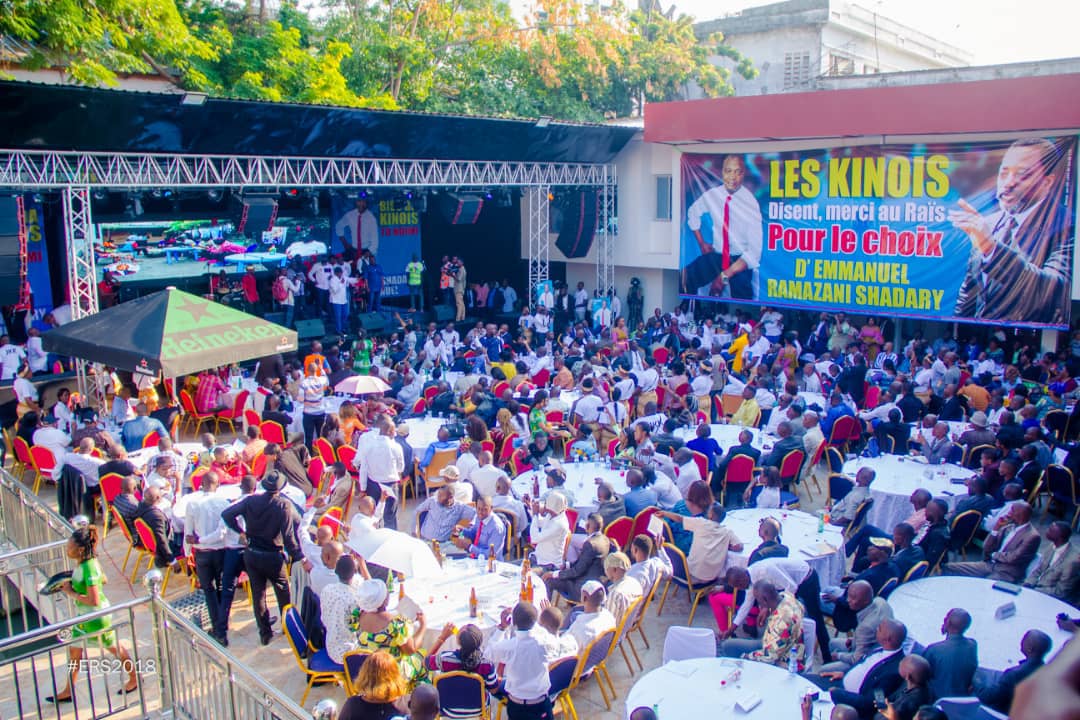DRC elections: Kabila’s perfectly imperfect choice of successor

The selection of Emmanuel Shadary to be the regime’s presidential candidate has surprised many. None more so than Shadary himself.

A campaign event featuring a banner showing presidential candidate Emmanuel Shadary along with the outgoing President Joseph Kabila. Credit: Shadary Campaign.
On 27 October, presidential candidate Emmanuel Ramazani Shadary was officially presented to thousands of voters at the Kinshasa Stadium Tata Raphaël. In attendance to see him was a disparate crew of heavyweights from politics and business, all claiming to be members of the newly-minted Front Commun pour le Congo (FCC). Most were chauffeured there in government-issued vehicles and were under heavy police protection, adding to allegations the event benefited from state machinery.
At one point, the top brass of the FCC took turns to thank the outgoing President Joseph Kabila and praise his handpicked successor. Their speeches were accompanied by cheers from supporters who wore clothes featuring pictures of Kabila and Shadary and waved party banners. According to allegations, most were paid to be there.
The event looked good for Shadary. But despite the rosy image conveyed, most analysts agree that the former interior minister’s chances in the upcoming 23 December election should be slim. He has a very limited independent power base and is not widely known. He is under international sanctions for his alleged role in the repression of anti-Kabila demonstrations in 2016. In a recent opinion poll, just 16% of voters said they planned to vote for him.
All of this begs the question of why President Kabila picked Shadary as his successor. Based on our research on this subject, we argue that part of the answer lies in the structure and functioning of the Democratic Republic of Congo’s (DRC) political space.
How the Congo’s politics works
To understand why Kabila chose Shadary, we first need to appreciate how the country’s political system operates. In the DRC, power is heavily concentrated in the presidency. The executive, judiciary, legislature and parastatals are all totally or partially subservient to Kabila, while institutions that are meant to check his power rarely interfere.
Members of the president’s “court” or inner circle meanwhile wield power that extends far beyond their functions. This group – which is composed of a narrow group of formal and informal allies, including legal advisors, military officers and businessmen – is often used by Kabila to circumvent formal structures of governance and control.
Being part of the president’s court means getting a share of the cake. However, while figures in this elite group are influential, they are also expendable. This means they must compete with one another. Many, especially those without independent power bases, do so by defending the president’s actions indiscriminately.
Some of the cake is also shared with the president’s adversaries as a form of co-optation. In order to maintain stability, dissatisfied former allies and opportunistic adversaries are often pacified through the awarding of public offices.
The DRC’s political culture is thus highly personalised, a characteristic that filters down to lower levels too. Individuals looking for a government post, for example, will look for a political godfather or “parrain”. Through this contact, they will try to establish or consolidate links to the president or members of his entourage. This may be done through emphasising their ethno-regional affinities with them, their influence within their parties, or by demonstrating loyalty to the president through flattery and praise.
Once an office is awarded, keeping it requires constant upkeep with benefactors. Holders of office have to nurture loyalty with both their patrons and clients. They do so by sharing access to financial benefits, demonstrating loyalty, and ensuring they don’t present any threat to their superiors.
Importantly, access to a political position does not necessarily mean controlling it. Key strategic areas such as natural resources and security are tightly controlled by the presidency and his court. Ministers or other actors formally in charge of these sectors are little more than rubber-stamps for presidential instructions and rarely make key decisions autonomously. In many cases, decisions are made through informal channels and informal actors.
Security issues, for example, are often handled by the ANR (Agence Nationale de Renseignement, national intelligence agency), DGM (Direction Générale de Migration, general directorate for migration), and a host of military figures all responsive to the president alone. Meanwhile, figures such as chief-of-staff Nehemie Mwilanya (nicknamed the “Vice-president”), legal advisors Norbet Nkulu and Jean Mbuyu, and business associate Albert Yuma play a considerable role in all political and business matters.
Before picking a successor
For President Kabila, preparing to step down after 17 years in power, it has been essential to shape this political landscape ahead of the December elections. Picking Shadary as his successor was certainly part of this process, but the final step. First, he has had to safeguard his personal security and vast business interests.
He has done this in a number of ways. To begin with, he got the national parliament to pass a law giving former heads of states various benefits such as immunity from prosecution, lifetime security guards, and a state house.
Second, he got the main ruling Parti Politique pour la Reconstruction et la Democratie (PPRD) to amend its status and create the position of president. This means that should he choose to hold this position, he will retain significant power over the PPRD’s future direction and MPs. His role in establishing the FCC also gives him authority over that coalition.
Third, in July, the president reshuffled the army by appointing several loyalists to key positions, including several who are still under sanctions for their alleged role in human rights violations. He also placed key collaborators, including Norbert Nkulu, in the constitutional court, which will play a decisive role should the election results be disputed.
So why Shadary?
Hand-picking a successor – in the face of mounting domestic and international pressure – was the final piece of the puzzle. Kabila tightly controlled this process, but would have faced a tricky decision. Many Congolese politicians oscillate between supporting the regime and the opposition. In fact, in an interview, Kabila claimed he could not find fifteen people he trusted in his own inner circle.
Nonetheless, in a bid to prove their loyalties, many prospective candidates engaged in quiet battles. It was never clear what Kabila’s criteria for picking a successor were or even whether he was definitely going to step down for a long time. But different individuals tried to increase their chances by showing off their academic qualifications, political experience, and ethno-regional backgrounds. Some went about subtly discrediting their rivals, including by leaking private audio recordings.
For fear of appearing too ambitious, none dared to question whether Kabila himself should run in the elections despite his ineligibility. In fact, when asked by the president to suggest a potential presidential candidate, many in the FCC put Kabila’s own name on their respective lists.
The entire process seemed deadlocked until 8 August, the deadline day for submitting candidacies. It was only then that regime’s pick was finally announced. Many were surprised at Kabila’s choice, but none more so than Shadary himself. The former minister was not considered among the most influential contenders nor did he have immediate presidential ambitions. In fact, he had already registered to run in the provincial elections.
So why Shadary? In sum, it seems that while 57-year-old’s lack of independent support base, relatively low influence, and meagre finances would ordinarily be huge electoral disadvantages, this was not the case in this instance. Instead, these same factors – combined with Shadary’s hard-core loyalty, ethno-regional affinities to the presidential family, and financial dependency – make him the perfect vehicle for Kabila’s ongoing control.
Research for this article was financed by the Knowledge Platform Security & Rule of Law’s Knowledge Management Fund.






DRCongo CENI imposed Election Machines or, Why the December National Vote be postponed to effect electoral logistic change in how DRCongo Citizen vote is cast and recorded enhancing DRCongo civic civil social stability.
Election security in DRCongo, in its purist sense, refers to anything that interferes with the ability of the DRCongo citizen to vote in guaranteeing for the DRCongo citizen that their vote is properly recorded and reported back to CENI exactly as intended by the DRCongo citizen.
The threat of an external entity for what ever reason hacking into a voting machine and changing votes is possible as a technical matter but the hacker would have to target many thousands of voting terminals in different locations while avoiding forensic detection and the detection of CENI inclusive of DRCongo intelligence people presuming both CENI and DRCongo Intelligence Agents are neutral, ethical and professional in not affecting the vote outcome in favour of a particular person candidate.
This makes voting machine hacking a real profound threat that needs to be taken most seriously, particularly if the CENI as an EMB, is considered suspect in professional ethical integrity inclusive of professional competence.
National/International Adversaries committed in perjuring the DRCongo civic civil social electoral process may not even necessarily care about changing election outcomes. Their existential goal may well be that which undermines confidence in the democratic election process. Therefore, these national/international adversaries do not potentially even have to successfully change votes, these national/international hackers just need to penetrate the electronic machine vote system in such a way requiring experts not being able to state that they have a high degree of confidence in the integrity of that particular result emanating from the voting machines definitely ensuring DRCongo State instability which may be Kabila’s preference in allowing him to remain in office.
If hackers can cause DRCongo citizens to question whether or not they have properly selected their leaders, these hackers have committed a successful assault on liberal democracy in DRCongo social political publics.
The threat to the CENI vote machine facilitated National Elections is real and ongoing but when the adversary’s goal is to undermine confidence in the DRCongo National Electoral System, one needs to be careful in how this threat to vote integrity is discussed.
The voting machine counterfactual most salient for me is:
If the DRCongo Citizen is convinced that their December National Election does not have legitimate ethical integrity, then those peoples who have issued warnings concerning the problems associated in making use of election machines are to an extent assisting the status quo corrupt DRCongo Kabila Oligarchy continue in [non-legitimate] public office in his continuance of theft corruption in governance.
The March 23 Movement (French: Mouvement du 23 mars), often abbreviated as M23 and also known as the Congolese Revolutionary Army (Armée révolutionnaire du Congo), was a rebel military group based in eastern areas of the Democratic Republic of the Congo (DRC), mainly operating in the province of North Kivu operatives must be detected and surveiled as they were given military training by the counter-revolutionary rulers of South Africa to kill blacks and commit military crimes against Zulus,Xhosas and Tswanas to revenge against their homeboys killed by the UN SPONSORED ARMY that includes South African soldiers and it cannot be ruled-out that they do not continue with their sponsored terrorism back home clandestinenely,intelligently,tactically and operationally as they hooked-up with the ultra-rightist organisation called AWB AND THEIR other sponsor was mobutu`s widow who secretly smuggled mobutu`s loot to South Africa!These rulers of South Africa are fronting for the sponsors of terrorism to push their corporations in every African country to marginalise and frustrate and submit blacks!